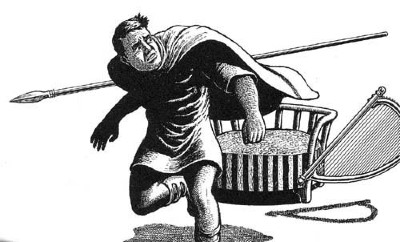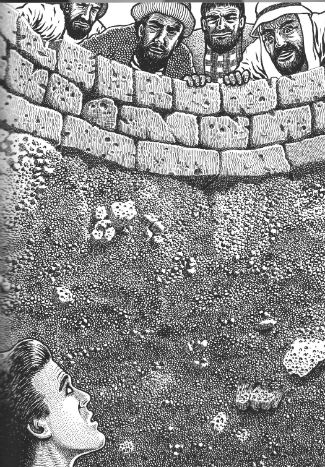To Fret…Or Not
By Neil Earle

To help cope with the threat of Corona Virus anxiety, one church I drive past displayed a sign that read: “The Bible says FEAR NOT 365 times.”
That’s one remembrance for every day of the year. And oh how we need it right now, we can all say.
Just like the Bible to end up relevant at key times in our personal and national life.
Take Psalm 37, for example.
Timeless Hope
Psalm 37 is called a Wisdom Song. That is, its primary purpose is not to lead us to worship or explain more of the Nature of God. It is instead one believer encouraging us how to appraoch living in high-stress times. Like everywhere in the Bible, the Good God is always in the picture, even if slightly off camera.
“Don’t fret!” What a message for our times!
The national news seems to be throwing pitchforks at us every night and the talk shows are notoriously vicious.
One wit opined we only have two speeds any more – Apathy and Hysteria. So here we are poised halfway between galloping hysteria and desperate hope.
And here is where the Wisdom of Psalm 37 can be so valuable to those who want to take advantage of its healing message.
Burning Coal, Anyone?
It’s intriguing that the phrase “fret not” occurs three times in the first twelve verses. The Hebrew word here is “charah,” and in context it is transliterated “lo-charah” – do not fret!! Three times – lo charah!
So we have to ask – what does charah mean? Interestingly, “Charah” is mostly translated heat, burning, to glow, to blaze, to be angry, displeased, incensed. No rocket science needed here. This psalm is in that healthy tradition of divine counsel to not get unreasonably upset about things, not to leave the Great God out of the picture neither nationally, globally nor personally. Without God our lives can be nothing but a whirligig of turmoil and randomness, events assailing us like the waves of the sea (Isaiah 57: 20-21). With God in the picture we will have troubles but he will be our stabilizer, the One who promises to see us through them (1 Corinthians 10:13).
Let’s take a closer look.
 David was treated an outlaw by King Saul for years before things worked out.
David was treated an outlaw by King Saul for years before things worked out.Verse 1: “Do not fret because of evildoers.”
As a pastor I remind people that the Psalms were not dictated by people in air-conditioned offices ready to send a memo before dashing off to their favorite watering hole. No. Not at all. David, author of this section, was forced to flee from rock to rock because of the jealously of King Saul. Remember? David had done nothing to deserve his stint in the wilderness. But he was treated as an outlaw for perhaps the good part of a decade before things worked out (1 Samuel 24:14). He knew about evildoers, gossipers, fifth columnists, betrayers (1 Samuel 23:12-13). When he wrote of the “arrow that flies by day,” well, that was no metaphor in his case.
Yet David’s advice is precious – “Trust in the Lord and do good.” Recently we studied 1 Samuel 25 for a story of where David’s anger burned hot, a time he turned blazing, burning incensed. Remember how God sent a wise woman to turn him from doing something despicable? Yes, David was not writing from an ivory tower. His situations are recorded to help us cope today (Romans 15:4).
Verse 4: “Delight yourself in the Lord.” What does that mean exactly? Again David’s biography is helpful. Few men praised God like the son of Jesse. Here was an eloquent solider-poet who had ample cause to celebrate God as the Rock of his life. Innumerable scrapes and setbacks tried his patience and his ingenuity. He made many mistakes – some of them quite serious. But at the end of the day David always knew how to get back home – “The Lord is my shepherd…I shall lack for nothing…he restores my soul…he leads me besides still waters.”
That’s delighting in the Lord, in what God can do and has done for us. Recalling the Great God’s interventions in the past, his track record. That kind of recall spurs thankfulness, optimism and hope. We relish the thought of God’s providential concern. We sometimes act as if we “have to pray or God is missing something,” as if he were some pagan deity whom we have to appease. Nothing could be further from the truth. It is we who are missing out when we choose not to delight in God. He after all is the one true Source of wisdom and help, the One who can give us “the breaks.”
One way to get back on that path is to simply pray a prayer of thanks for ten things that are going well in our lives. Try it. Write them down. Meditate on them as you kneel in prayer. You’ll see that nothing primes the pump of prayer like thanksgiving. Of all mortal humans, David knew that.
Commit, Rest, Trust
Verse 5: “Commit your way to the Lord…and he shall bring it to pass.”
One week I had twelve things to do that were more or less urgent. I did what I often do in such cases. I got up, prepared a cup of tea, sat down at my desk, read this psalm and some others, wrote out my assignments and laid them before the Lord in prayer. Result? Some of the ickiest jobs – like going to the garage with my car – worked out like clockwork. In fact the mechanic gave me a break – no charge for installing a new rear light. That doesn’t happen always but I know from 45 years in ministry that God is seen as much in the small as he is in the huge. Who knows, the prophet Joel asked, if God will not leave behind a blessing for seeking him in prayer and occasional fasting (Joel 2:14)?
This is not to treat God as our Valet in the Sky, but Psalm 37:5b promises: “he will bring it to pass.” 1 Peter 5 says to cast our cares on him because he cares for us. What an incentive to return to God, to trust him all over again with the big as well as the small. There’s nothing like it.
 Joseph languished in prison, but eventually was made Prime Minister of Egypt to save the world from famine. Who could have seen that coming?
Joseph languished in prison, but eventually was made Prime Minister of Egypt to save the world from famine. Who could have seen that coming?Verse 7 says “Rest in the Lord and wait patiently before him.”
Sometimes God tries the righteous for reasons that we only find out later. The patriarch Joseph was in prison when he interpreted the chief butler’s dream. The man got his job back as Joseph had foreseen. “Remember me,” Joseph asked him. But he forgot. For two years Joseph languished in prison until the time of promotion came. When it did Joseph was rewarded more richly than anyone in his family – made Prime Minister of Egypt to save the world from famine. Who could have seen that coming? God! God, of course. He knows the end from the beginning.
So do not fret if you seem to have been passed over, says verse 7. Oh boy, that can be so so hard to take. It’s one of the unkindest cuts in life. But we’ll all face something like that eventually. Don’t let the buffetings and scarrings of life sour your attitude. “Cease from anger,” this Psalm counsels us. “Forsake wrath, it only causes harm.”
One lady’s husband desperately wanted to be on the space shuttle program. She prayed and prayed hard about it. At the last minute her husband was bumped and she turned hostile and bitter towards God Himself. She could hardly bring herself to watch that shuttle launch she was so churning with anger. As she did, biting down her resentment, she saw “Challenger” explode before her eyes.
What a life lesson. How wise of Psalm 37 to advise us to cease from anger and fear, to stop fretting and to regain a healthy, godly perspective on life…and where it is going. It is God alone who knows the end from the beginning and he usually has a plan for us that is better than our own.
“The steps of a good man are ordered by the Lord, and he delights in His way. Though he fall he shall not be cast down, for the Lord upholds him with his hand” (Psalm 37:23-24).
Let’s be wise. Let’s trust in the Lord and do good. It worked for Joseph, it worked for David, it will work for you.